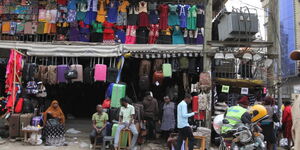The Postal Corporation of Kenya (PCK) has partnered with a local company to roll out drone delivery services countrywide.
PCK will now start delivering medical supplies, e-commerce purchases and essential cargo using drones.
The three-year agreement with the Kenyan cargo drone company will see them manufacture and operate drones that can travel up to 70 kilometers and carry a payload of up to 4 kilograms.
Kenya is set join the likes of Rwanda who began zip-line commercial drone deliveries back in 2016.
According to Dan Kagwe, the Postmaster General, the move will help the courier and logistics services provider get back to the market.
“We want to invest in the production of drones, it is not only our obligation as government to invest in Kenyan technology, but we are also keen on clawing back our market position as the courier and logistics services provider of choice,” Dan Kagwe stated.
Kagwe noted that the partnership would make the delivery of essential medical supplies and other goods speedy and cost effective, through getting rid of intermediaries.
Postal Corporation of Kenya currently has a partnership agreement with Kenya Medical Supplies Authority (Kemsa).
The drone company will be tasked to provide the technical expertise in the drones’ design, manufacturing, maintenance, software integrations and regulatory approvals, while adjusting the kilometres of travel for drones to up to 200km and above on a need basis.
According to James Munyoki, the CEO and Co-Founder of the drone company, they are the only organisation approved to manufacture drones in the country.
“Our company has already been issued a remote aircraft operations certificate (ROC) by the Kenya Civil Aviation Authority, which makes us the only company approved for drone manufacturing and one of a few approved to operate drones in the country,” Munyoki stated.
Munyoki highlighted that his inspiration to manufacture drones is as a result of the mother who is diabetic and suffered from arthritis could not get medication on time when they were growing up owing to the inaccessibility of healthcare.












